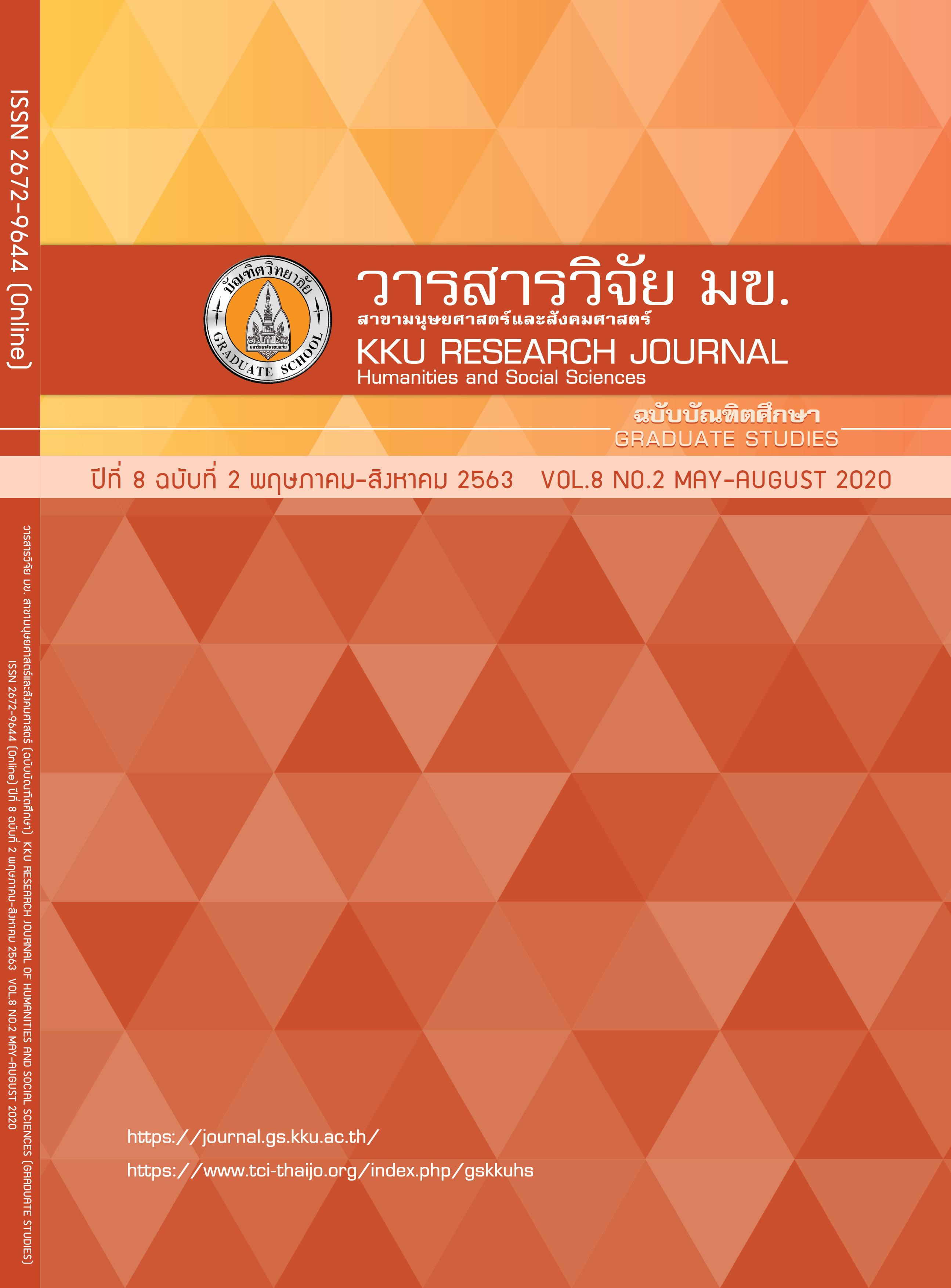Development of Collaborative Problem Solving Competency of 11th Grade Students Using STEM Learning Through Engineering Design Process in Geological Phenomena
Keywords:
STEM Education, Engineering design process, Collaborative problem solvingAbstract
The purposes of this research are to study the STEM approach based on engineering design process to enhance the collaborative problem solving competencies (CPS) and study the effect of teaching approach to promote CPS in geological phenomena. The methodology of this research was classroom action research 3 cycles. The research instruments included lesson plans, reflective journal, CPS observation form and CPS test. Data analysis by content analysis. The research found that STEM approach should emphasized on the most discussion and reflection together and consists of 7 steps as 1) Find and identify problems 2) Creating concepts 3) Planning 4) Constructing model 5) Testing 6) Presentation and discussion and 7) Reflection. In addition, found that students are more developing in CPS and most students are at a high level of competencies. Students need to be continuously developed, that will increase more effectively.
References
summary. Bangkok: ISPT; 2018. Thai.
2. OECD. PISA 2015 Draft collaborative problem solving framework.
Paris: OECD; 2013.
3. MOE Thailand. The basic education core curriculum A.D. 2008.
Bangkok: The Agricultural cooperative federation of Thailand, 2008. Thai.
4. Bündnis Entwicklung Hilft. World risk report analysis and prospects
2017. Berlin: 4.Bündnis Entwicklung Hilft, 2018.
5. Boonkanpai N. What is a disaster? [Internet]. 2010
[Cited 2018 Nov 22]. Available from: http://www.dmr.go.th/down
load/teacher/Phichit/Geohazards.pdf. Thai.
6. Wiwekwin R, Kosuwan S. Earthquake 5.5.2014 Chiang Rai
[Internet]. 2014 [Cited 2018 Nov 22]. Available from: http://library.
dmr.go.th/Document/Proceedings-Yearbooks/M_1/2557/10400.pdf.
Thai.
7. MGR Online. Need? Which children have to learn "astronomy"
[Internet]. 2013 [Cited 2018 Nov 22]. Available from:
https://mgronline.com/qol/detail/9560000067158. Thai.
8. MGR Online. Earthquake What can be taught to Thai children?
[Internet]. 2007 [Cited 2018 Nov 22]. Available from:
https://mgronline.com/science/detail/9500000059303. Thai.
9. Chaidech T. Development of collaborative problem solving
competency using research-based learning according to STEM
education in fossil fuels and products [MEd Thesis].
Naresuan University; 2016. Thai.
10. Neadratsamee C. Development of learning management
based on STEM education through engineering design process
for promoting collaborative problem solving in environmental
chemistry for 10th grade students [MEd Thesis].
Naresuan University; 2017. Thai.
11. Cholsin J. The action research for developing learning
management on stoichiometry based on STEM approach
emphasized engineering design process to promote
collaborative problem solving competency [MEd Thesis].
Naresuan University; 2016. Thai.
12. Wachiraprakarn Wittayakom School. Summary of results
1st semester. Kamphaeng Phet: Academic department; 2018. Thai.
13. Sampurno J, Sari A, Wijaya D. Integrating STEM (science,
technology, engineering, mathematics) and disaster (STEM - D)
education for building students’ disaster literacy. [Internet]. 2015
[updated 2018 Nov 22; cited 2018 Nov 22]. Available from:
https://www.researchgate.net/publication/281775230
14. Lora G. Engineering is elementary: identifying instances of
collaboration during the engineering design process [PhD Thesis].
Syracuse University; 2018.
15. Kijkuakul S. Scientific learning management: The guide for
teachers in 21st century. Petchaboon: Chunladit printing Press;
2014. Thai.
16. Capraro M, Capraro M, Morgan R. STEM project-based
learning an integrated science, technology, engineering,
and mathematics (STEM) approach. (2nd ed.). Rotterdam:
Sense publishers; 2013.
17. Householder L, Hailey E. Incorporating engineering
design challenges into STEM courses. [Internet]. 2012
[cited 2019 Apr 10]. Available from: https://files.eric.ed.gov/
fulltext/ED537386.pdf
18. Srisangngam P. Developing 5E instructional model
blended engineering design via STEM education approach
for enhances critical thinking skills of grade 8 students.
Veridian E-Journal Silpakorn University. 2018; 11(2):
2448-60. Thai.
19. Tucker J, Courts B. Utilizing the internet to facilitate
classroom learning. Journal of college teaching & learning.
2010; 7(7): 37-44.
20. Martin-Erro A, Dominguez M, Espinosa M. The role of
sketching in engineering design and its presence on engineering
education. [Internet]. 2016 [cited 2019 Apr 10]. Available from:
https://www.researchgate.net/publication/298786612
21. Tytler R. Drawing to learn in STEM. [Internet]. 2016
[cited 2019 Apr 10]. Available from: https://research.acer.edu.au/
cgi/viewcontent.cgi?article=1286&context=research_conference
22. Good L, Brophy E. Looking in classrooms. (2nd ed.).
New York: Harper & Row; 1978
23. NRC. A framework for K-12 science education: practices,
crosscutting concepts, and core ideas. Washington, DC:
The National Academies; 2012.
24. Faculty of Education, Phetchaburi Rajabhat University.
Reflective teaching. [Internet]. n.d. [cited 2019 Apr 10].
Available from: http://edu.pbru.ac.th/e-media/16.pdf. Thai.
25. Nyet Moi Siew, Henry Goh and Fauziah Sulaiman. Integrating
STEM in an engineering design process: the learning experience
of rural secondary school students in an outreach challenge
program. Journal of Baltic Science Education. 2016; 15(4): 477-493.




